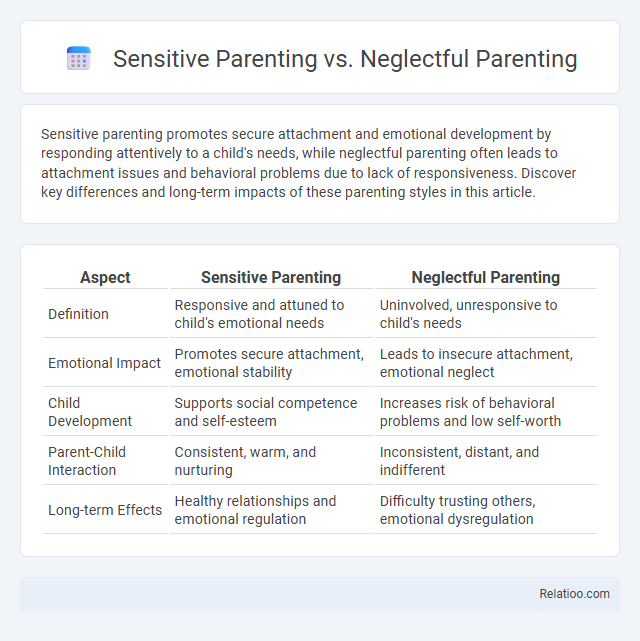Sensitive parenting promotes secure attachment and emotional development by responding attentively to a child's needs, while neglectful parenting often leads to attachment issues and behavioral problems due to lack of responsiveness. Discover key differences and long-term impacts of these parenting styles in this article.
Table of Comparison
| Aspect | Sensitive Parenting | Neglectful Parenting |
|---|---|---|
| Definition | Responsive and attuned to child's emotional needs | Uninvolved, unresponsive to child's needs |
| Emotional Impact | Promotes secure attachment, emotional stability | Leads to insecure attachment, emotional neglect |
| Child Development | Supports social competence and self-esteem | Increases risk of behavioral problems and low self-worth |
| Parent-Child Interaction | Consistent, warm, and nurturing | Inconsistent, distant, and indifferent |
| Long-term Effects | Healthy relationships and emotional regulation | Difficulty trusting others, emotional dysregulation |
Introduction to Parenting Styles
Sensitive parenting emphasizes attuned responses to your child's emotional and physical needs, fostering secure attachment and healthy development. Neglectful parenting, characterized by a lack of attention and responsiveness, often leads to adverse outcomes such as emotional insecurity and behavioral problems. Responsive caregiving balances sensitivity with consistency, promoting cognitive growth and social competence through timely and appropriate support.
Defining Sensitive Parenting
Sensitive parenting involves recognizing and accurately interpreting a child's cues and responding promptly with appropriate care, fostering secure attachment and emotional development. This approach contrasts with neglectful parenting, where caregivers are unresponsive or indifferent to a child's emotional and physical needs, often leading to developmental delays. Responsive caregiving aligns closely with sensitive parenting, emphasizing timely and nurturing responses that support a child's growth and well-being.
Understanding Neglectful Parenting
Neglectful parenting is characterized by a consistent lack of responsiveness to a child's emotional and physical needs, often leading to impaired development and emotional difficulties. Unlike sensitive parenting, which involves recognizing and appropriately responding to your child's signals, neglectful parenting ignores or dismisses these cues, resulting in neglect and inadequate care. Understanding neglectful parenting is crucial for identifying at-risk children and intervening with supportive responsive caregiving strategies that promote healthy growth and attachment.
Key Differences Between Sensitive and Neglectful Parenting
Sensitive parenting involves recognizing and appropriately responding to a child's emotional and physical needs, fostering secure attachment and healthy development. Neglectful parenting is characterized by a lack of attention, care, and emotional support, leading to potential developmental delays and behavioral issues. Responsive caregiving, closely related to sensitive parenting, emphasizes timely and consistent reactions to a child's cues, promoting trust and social-emotional growth.
Impact on Child Emotional Development
Sensitive parenting fosters secure attachment and emotional regulation by consistently responding to a child's needs, promoting empathy and trust. Neglectful parenting often results in emotional difficulties, including low self-esteem, anxiety, and attachment disorders due to lack of responsiveness and care. Responsive caregiving enhances emotional development by providing a stable environment where children learn to express emotions appropriately and develop social competence.
Effects on Social and Cognitive Growth
Sensitive parenting fosters secure attachment and enhances your child's social competence and cognitive development through consistent emotional responsiveness and support. Neglectful parenting often leads to impaired social skills, emotional difficulties, and delayed cognitive milestones due to lack of attention and stimulation. Responsive caregiving promotes optimal brain development by recognizing and addressing your child's needs promptly, resulting in improved learning abilities and stronger social relationships.
Long-term Outcomes: Sensitive vs Neglectful Parenting
Sensitive parenting promotes secure attachment, emotional regulation, and higher self-esteem in children, laying a foundation for healthy relationships and academic success. Neglectful parenting often leads to attachment disorders, behavioral problems, and increased risk of mental health issues due to a lack of emotional support and guidance. Your consistent emotional availability and responsiveness can significantly influence your child's long-term social and psychological well-being.
Recognizing Signs of Neglectful Parenting
Recognizing signs of neglectful parenting includes consistent failure to provide basic needs such as food, hygiene, medical care, and emotional support, leading to developmental delays and behavioral issues in children. Neglectful parenting is characterized by a lack of supervision, indifference to a child's physical and emotional well-being, and minimal interaction, which starkly contrasts with sensitive parenting and responsive caregiving that prioritize attentiveness and nurturing. Early identification of these signs is crucial for intervention and promoting healthier child development outcomes.
Strategies to Foster Sensitive Parenting
Strategies to foster sensitive parenting include tuning into Your child's emotional cues, responding consistently to their needs, and creating a secure environment that promotes trust and emotional development. Training programs and support groups can help caregivers recognize subtle signals and improve their empathy and patience. Structured routines combined with positive reinforcement strengthen the bond, differentiating sensitive parenting from neglectful caregiving and enhancing responsive caregiving practices.
Conclusion: Choosing a Nurturing Parenting Approach
Choosing a nurturing parenting approach, such as sensitive and responsive caregiving, fosters secure attachment and emotional well-being in children, unlike neglectful parenting which can lead to developmental challenges. Your commitment to attentive and empathetic interactions supports healthy brain development and resilience in your child. Prioritizing sensitivity over neglect ensures a foundation for lifelong positive relationships and self-esteem.

Infographic: Sensitive Parenting vs Neglectful Parenting
 relatioo.com
relatioo.com